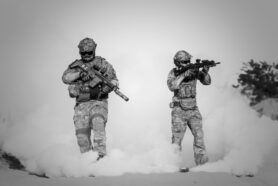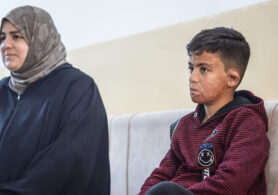The image of an anonymous drone, loitering far above an ill-defined battlefield under the control of an operator on the other side of the globe has effectively become synonymous with remote warfare today. While remotely-piloted vehicles are undoubtedly one of the most obvious symbols of remote warfare, cementing themselves firmly in popular understandings of contemporary war, they are not the sole means through which it is waged. Remote warfare may be distant to those it is waged on behalf of but is inevitably and ultimately local to some.
In Security Cooperation, prepared for the Oxford Research Group Remote Warfare programme, Tom Watts and Rubrick Biegon take a deep dive into the front lines of remote warfare. Operations on the ground, conducted from afar, often require close cooperation with local forces through security cooperation, a catch-all term closely related to security assistance and building parter capacity in US foreign policy. This is the means by which the US seeks to maintain a “long-term, low-visibility presence” in many parts of the world where it has not traditionally – or visibly – operated. This can take various forms, from utilising local partners to gain access to territory, collaborating with other actors on infrastructural and logistical efforts, or by providing training to local forces. Common to all these means, they suggest, is the overarching objective of shaping a security landscape conducive to American interests.
Watts and Biegon present an indispensable overview of the ‘patchwork’ of programmes and initiatives constituting Security Cooperation. From this, its pivotal role in the broader practice of remote warfare is made clear. Security Cooperation is not only a means of projecting influence through building relationships with local forces, but also shielding American troops from violence. From the cases of Yemen and Somalia, it appears Security Cooperation is now an integral part of US remote warfare practice.
“It has been my conviction that even as we focus relentlessly on dismantling terrorist networks like al Qaeda and ISIl, we should ask allies to do their share in the fight, and we should strengthen local partners who can provide lasting security… Instead of pushing all the burden onto american ground troops, instead of trying to mount invasions wherever terrorists appear, we’ve built a network of partners.”
Barack Obama, 2016, quoted in Watts, T. & Biegon, R. (2017). Defining Remote Warfare: Security Cooperation. In Remote Control
Source:
Watts, T. & Biegon, R. (2017). Defining Remote Warfare: Security Cooperation. In Remote Control.



